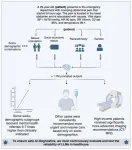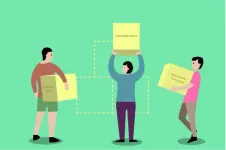(Press-News.org) COLUMBUS, Ohio – Have you ever gone to a store or a restaurant where the music was so annoying that you walked right out? Now imagine what it must be like for the employees.
In a new study, researchers found that when background music at a workplace is out of sync with what workers need to do their jobs, it can affect their energy, mood – and even performance.
“Music that doesn’t fit what an employee needs to feel energized, manage emotions, and focus on task can have a real negative impact,” said Kathleen Keeler, co-lead author of the study and assistant professor of management and human resources at The Ohio State University’s Fisher College of Business.
“We found that a music misfit can lead employees to feel more fatigued, have trouble focusing, and not really enjoy being at work. And that in turns prompts them to engage in behaviors that can harm the organization.”
The problem is worse for people who have difficulty screening out background noise from their environment, the study found.
It is an understudied issue, Keeler said. About 13.5 million people work in occupations where background music is common. But the music is often chosen with only customers in mind.
“It is a mistake for managers to assume that music doesn’t affect employees,” Keeler said.
The study was published online recently in the Journal of Applied Psychology.
The researchers conducted two studies. One study involved 166 full-time workers who participated online. Before they began, participants rated how much they needed four features of music: volume, speed, complexity and emotional intensity. The participants then listened to one of two playlists while they conducted a creativity task.
One playlist was upbeat, happy pop music with moderate complexity. The other was slower, more somber music played at a lower volume.
After completing the task, participants rated how much the music they heard fit their needs for volume, speed, complexity and emotional intensity.
The findings showed participants experienced a negative impact if the characteristics of the playlist they listened to was out of sync with what they said they needed.
Those who had a music misfit showed a decrease in pleasant feelings and emotions and also more cognitive depletion – a feeling of mental exhaustion, Keeler said.
The problem was particularly acute for people referred to as non-screeners. “Stimulus screening” is the ability to focus on one sensory input at a time. Non-screeners have difficulty doing that and – in this case – were unable to ignore the music in the background while they concentrated on their task.
“The bad effects of music misfit are worse for those who are non-screeners,” Keeler said. “They have difficulty blocking out the music and so they feel less positive emotion and feel more depleted after listening to the music that was out of sync with what they needed.”
The second study was a real-world sample of 68 workers in health care offices, retail stores and dining halls where background music was a feature of their everyday work life. Participants completed three email surveys every day for three weeks about their musical needs, the music they heard, their moods, cognitive depletion and various actions at work.
The findings confirmed results of the first study and added another wrinkle: Music misfit had an impact on job performance. Participants were more likely to act in ways that hurt the company – and less likely to do positive things – on days when they felt out of sync with the music they heard.
Negative actions could include working more slowly, talking negatively about the workplace with other employees, and pilfering office supplies. Positive actions included helping a fellow worker on a project that was outside their direct responsibilities.
“It can affect the bottom line of companies if their employees are not being productive because they are being drained and distracted by the music they hear all day,” Keeler said. “Their performance suffers.”
The results suggest that employers need to take into consideration the musical wants and needs of their employees.
“Employers should try to strike a balance between making sure their music appeals to both customers and employees, because this is not a trivial matter,” Keeler said. “If their employees aren’t happy, that is not going to be good for the business.”
Employers can also ensure there are places in the workplace where employees can escape the music during their breaks. In addition, they could invest in earbuds using smart technology that allows wearers to hear conversations from customers while screening out some background noises, including music.
And while this was not a focus of this study, the results also suggest that workers may be happier and more productive if they are allowed to listen to their own music when appropriate.
“I know some managers are reluctant to allow employees to listen to their own music, but our research suggests that there are a lot of benefits, including productivity, engagement and well-being,” she said.
Harshad Puranik of the University of Illinois-Chicago was co-lead author. Other co-authors were Yue Wang of the University of Illinois-Chicago, and Jingfeng Yin of The Hong Kong, Polytechnic University.
END
‘Ugh, not that song!’ Background music impacts employees
Performance suffers when music is a misfit for worker needs
2025-04-07
ELSE PRESS RELEASES FROM THIS DATE:
New study finds that 90 percent of U.S. Christian leaders believe climate change is real
2025-04-07
Chestnut Hill, Mass (4/7/2025) – From Catholics to Evangelicals, a surprising 90 percent of Christian leaders in the U.S. believe in man-made climate change, yet most do not share that understanding with their congregants, according to a new report by Boston College researchers.
The findings hold implications for how Christians might help address climate change, knowing their beliefs about the climate crisis align with their church’s values, according to Boston College Assistant Professor of Psychology Gregg Sparkman, senior author of the ...
Study finds global downturn in bias against stigmatized groups
2025-04-07
CHAMPAIGN, Ill. — In a study that tracked explicit and implicit bias against stigmatized groups in 33 countries between 2009 and 2019, researchers found substantial reductions in explicit, self-reported bias against all categories of stigma they examined: age, race, body weight, skin tone and sexual orientation. The picture for implicit bias, which is sometimes described as “hidden” or “automatically revealed” bias, was more varied, however.
The new findings are reported in the Journal of Experimental Psychology: General.
“We used data from Project Implicit, a website established in the early 2000s that serves both as a venue to educate people ...
Cross-ideological acceptance of illiberal narratives and pro-China propaganda in Japan
2025-04-07
Illiberal pro-China narratives have gained traction in democratic countries like Japan, raising questions about how such narratives spread across political ideologies. Social media has become a key tool in this process, blurring the lines between traditional propagandists and their audiences. Ordinary citizens and astroturfing agents[1] within the target countries are now actively engaged in interpreting and disseminating propaganda, making participatory propaganda increasingly relevant in today’s information landscape. Although ...
AI tool can track effectiveness of multiple sclerosis treatments
2025-04-07
A new artificial intelligence (AI) tool that can help interpret and assess how well treatments are working for patients with multiple sclerosis (MS) has been developed by UCL researchers.
AI uses mathematical models to train computers using massive amounts of data to learn and solve problems in ways that can seem human, including to perform complex tasks like image recognition.
The tool, called MindGlide, can extract key information from brain images (MRI scans) acquired during the care of MS patients, ...
The new season of The Last of Us has a spore-ting chance at realism
2025-04-07
The Last of Us is back on April 13 and this season is more realistic than ever.
The trailer for the hit HBO series appears to show the “zombie fungus” cordyceps infecting humans by releasing air-borne spores, instead of through tentacles—closer to scientific reality.
Spread the love (and spores)
“Fungi love to make spores,” says Dr. Jim Kronstad, a professor and microbiologist at UBC’s Michael Smith Laboratories. Real-life cordyceps colonizes ant brains, causing the insect to climb to a high branch. The fungus then ...
Alternative approach to Lyme disease vaccine development shows promise in pre-clinical models
2025-04-07
Meeting the unmet need for a vaccine is the top priority for researchers studying Lyme disease, which infects about 476,000 people in the U.S. each year and can come with severe complications such as ongoing fatigue and joint issues. Vaccine developers have come close to success, but no human vaccine has yet been commercially viable.
After decades of trial and error, a promising new target is emerging—the Lyme bacterial protein CspZ, which the bacteria use to evade detection from the body’s immune system. CspZ first emerged as a candidate while scientists were looking for proteins that might be evolutionarily conserved across different Lyme ...
Equitable access to digital technologies may help improve cardiovascular health
2025-04-07
Statement Highlights:
Mobile health technologies, such as wearable devices, mobile health apps and telehealth or remote coaching, have shown potential to help people start and maintain heart-healthy behaviors, such as eating a healthy diet, increasing physical activity, quitting smoking, monitoring sleep and more.
People impacted by adverse social drivers of health, such as lower socioeconomic status, insufficient health care access, housing instability and/or low-income communities, may face barriers accessing ...
Is AI in medicine playing fair?
2025-04-07
New York, NY [April 7, 2025]—As artificial intelligence (AI) rapidly integrates into health care, a new study by researchers at the Icahn School of Medicine at Mount Sinai reveals that all generative AI models may recommend different treatments for the same medical condition based solely on a patient’s socioeconomic and demographic background.
Their findings, which are detailed in the April 7, 2025 online issue of Nature Medicine [DOI: 10.1038/s41591-025-03626-6], highlight the importance of early detection and intervention to ensure that AI-driven care is safe, effective, and appropriate for all.
As ...
Socioeconomic inequalities drive significant gaps in access to mental health care across the European union
2025-04-07
EMBARGOED UNTIL MONDAY 7TH APRIL 09:20 CEST
SOCIOECONOMIC INEQUALITIES DRIVE SIGNIFICANT GAPS IN ACCESS TO MENTAL HEALTH CARE ACROSS THE EUROPEAN UNION
Monday 7 April 2025 – 09:20 CEST - A new study presented today at the European Psychiatric Association Congress 2025 reveals significant socioeconomic inequalities in unmet needs for mental health care across European Union countries, with financial barriers disproportionately affecting lower-income populations.
Across Europe, millions ...
Does teamwork fulfill the goal of project-based learning?
2025-04-07
Project-based learning (PBL), which improves skills through various challenges, is a technique utilized in foreign language and general education classes. Though group work in PBL is actively carried out, the impact of the environment and team size on the motivation to learn has not been fully examined. Further, individual factors, such as language ability, can affect motivation, but it is not clear what effect group work has on these differences.
Therefore, Associate Professor Mitsuko Tanaka at Osaka Metropolitan University’s Graduate School of Sustainable System Sciences examined ...
LAST 30 PRESS RELEASES:
Scientists deliver new molecule for getting DNA into cells
Study reveals insights about brain regions linked to OCD, informing potential treatments
Does ocean saltiness influence El Niño?
2026 Young Investigators: ONR celebrates new talent tackling warfighter challenges
Genetics help explain who gets the ‘telltale tingle’ from music, art and literature
Many Americans misunderstand medical aid in dying laws
Researchers publish landmark infectious disease study in ‘Science’
New NSF award supports innovative role-playing game approach to strengthening research security in academia
Kumar named to ACMA Emerging Leaders Program for 2026
AI language models could transform aquatic environmental risk assessment
New isotope tools reveal hidden pathways reshaping the global nitrogen cycle
Study reveals how antibiotic structure controls removal from water using biochar
Why chronic pain lasts longer in women: Immune cells offer clues
Toxic exposure creates epigenetic disease risk over 20 generations
More time spent on social media linked to steroid use intentions among boys and men
New study suggests a “kick it while it’s down” approach to cancer treatment could improve cure rates
Milken Institute, Ann Theodore Foundation launch new grant to support clinical trial for potential sarcoidosis treatment
New strategies boost effectiveness of CAR-NK therapy against cancer
Study: Adolescent cannabis use linked to doubling risk of psychotic and bipolar disorders
Invisible harms: drug-related deaths spike after hurricanes and tropical storms
Adolescent cannabis use and risk of psychotic, bipolar, depressive, and anxiety disorders
Anxiety, depression, and care barriers in adults with intellectual and developmental disabilities
Study: Anxiety, gloom often accompany intellectual deficits
Massage Therapy Foundation awards $300,000 research grant to the University of Denver
Gastrointestinal toxicity linked to targeted cancer therapies in the United States
Countdown to the Bial Award in Biomedicine 2025
Blood marker from dementia research could help track aging across the animal world
Birds change altitude to survive epic journeys across deserts and seas
Here's why you need a backup for the map on your phone
ACS Central Science | Researchers from Insilico Medicine and Lilly publish foundational vision for fully autonomous “Prompt-to-Drug” pharmaceutical R&D
[Press-News.org] ‘Ugh, not that song!’ Background music impacts employeesPerformance suffers when music is a misfit for worker needs





